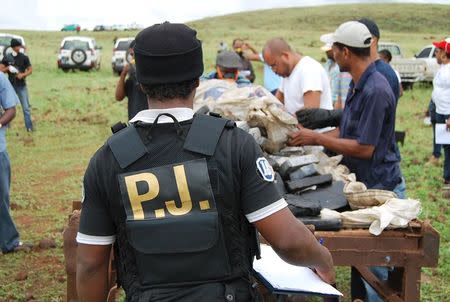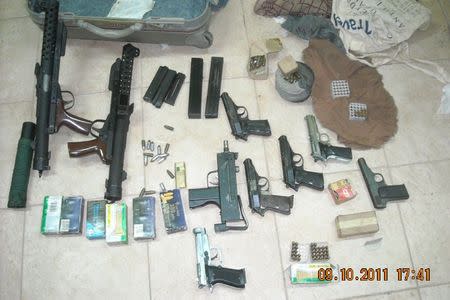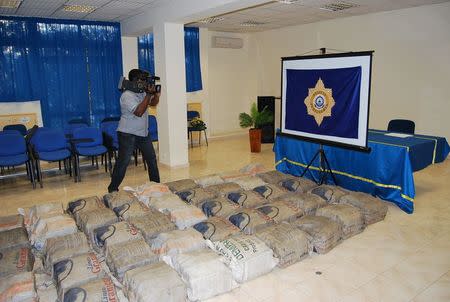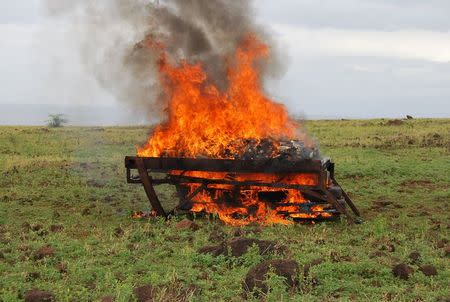Tiny Cape Verde picks big fight with drug gangs
By David Lewis and Julio Rodrigues PRAIA (Reuters) - When Cape Verde police dismantled a drugs network preparing to smuggle tens of millions of dollars of cocaine to Europe in 2011, the operation was hailed as a rare victory against international crime by one of Africa's smallest states. Within two years it had yielded a series of convictions as well as further seizures of cash and real estate. Soon after that, however, senior officials began receiving threats. Then, in September last year, a gunman shot dead the 56-year-old mother of Katia Tavares, Cape Verde's top anti-drugs investigator, at her yellow two-storey house in the capital, Praia. The son of Prime Minister Jose Maria Neves was wounded in a separate shooting months later. Both attacks have been linked to the drugs probe, testing the tiny country's determination to crack down on powerful smuggling gangs ahead of elections early in 2016. A cluster of 10 volcanic islands 570 km (350 miles) off Senegal, Cape Verde stands out both as a pocket of relative stability in West Africa and for its firm action against the networks channeling Latin American cocaine to Europe. European and U.S. law enforcement officials engaged in the same struggle view Cape Verde's efforts as a model for the region. "They are much better than on the mainland," said one. But the violence unleashed in the wake of the so-called Flying Boat case - a reference to the smugglers' high-powered motor launch - has pushed security concerns to the forefront of public debate. "They're trying to threaten the authorities and the state as it fights organized crime," said Patricio Varela, head of the country's Judicial Police. The Tavares killing sent shockwaves through the former Portuguese colony's population of 500,000. Prosecutor Oscar Tavares - no relation - described it as an attack on democracy. Although accustomed to occasional bloodshed among traffickers, the state had never seen such a direct challenge to its authority. Cape Verde has suffered no coups or civil conflict in the four decades since independence, despite its scant resources and punishing drought cycles. Several Western countries sent teams to support local police in the wake of the shootings, and a suspect was killed resisting arrest. SLAVERY TO COCAINE By the 1990s, Cape Verde had become a hub for fast-growing narcotics traffic, echoing its past importance as a trans-Atlantic staging post for the slave trade, ocean-going steamers and early commercial aviation. Its jagged coastlines and 300,000 square-mile maritime zone resemble a smugglers' paradise. Weak law-enforcement resources, lax financial controls and a degree of official complicity allowed the drugs trade to flourish almost unchecked, with local proceeds laundered through a construction boom supported by expanding tourism. In the past decade, however, Cape Verde has turned its Judicial Police into one of West Africa's strongest organized crime squads. Anti-money laundering laws were introduced in 2002, improved in 2009 and are being tightened again. The postal service scans packages with state-of-the art equipment, and airline passengers are greeted by sniffer dogs. Radar and satellites are used to track suspect boats from an operations center funded by the United States - which used the archipelago to launch its own 2013 drugs sting against senior military officials in Guinea Bissau. http://reut.rs/1MIn66q In the Flying Boat case, months of investigation led to the seizure of 1.5 tonnes of cocaine in the heart of Praia, as smugglers attempted to stash it in a basement near the state television building. Among nine people jailed were the former head of the local stock exchange, Verissimo Monteira Pinto, and prominent real estate investor Paulo Ivone Pereira. Police confiscated cash, vehicles and property worth tens of millions of dollars, including a glass-fronted office building that now serves as Cape Verde's armed forces headquarters. OUTMATCHED Last November, authorities seized another 500 kg (1,100 pounds) of cocaine in an operation that led to the jailing of six people including Swiss, Spanish and Cuban nationals. Although they have won some key battles, the 160-strong Judicial Police remain far outmatched in the war against traffickers. Cape Verde has five patrol boats, only one of which can operate beyond coastal waters, and its sole surveillance plane has been out of action for years, diplomats said. Few believe the flow of narcotics has been seriously curtailed. Low drug prices suggest a significant trade is continuing, another Western security official said. Cocaine sells for $10,000-15,000/kg in Cape Verde, compared with $20,000 or more on the mainland - a sign that traffickers are getting shipments through to European ports such as Lisbon and Rotterdam. "They took a hit from the authorities but have shown they are determined to continue their activities," said Pedro Pires, Cape Verde's last president. Pires, a member of the West African Commission on Drugs established by former United Nations chief Kofi Annan, told Reuters the violent response to the Flying Boat drugs bust was "an attempt to intimidate the state". The control now exerted by drug gangs over large parts of Mexico offers a cautionary tale, he added. "The Mexicans lost vast swathes of territory to the criminals. We have to fight the groups swiftly, before they get installed." In a pre-election year, the shootings have fueled anxiety about a broader crime wave often blamed on U.S.-style gang culture, imported by young citizens returning from Cape Verde's large diaspora. Questions were asked about whether convicted criminals had been able to operate and order reprisals from jail. Judicial Police officers, already well paid by regional standards, have been striking to press for higher wages to reflect the increased dangers they face. For the government of President Jorge Carlos Fonseca, who is expected to run again, the security worries add to problems including the knock-on effects of European austerity, faltering rains and debt amounting to almost a year of economic output. While the government's handling of the organized crime crackdown is a subject of nervous discussion, those on its front line know they still command overwhelming public support. "We don't feel intimidated," police chief Varela said. "The struggle continues." (Editing by Joe Bavier and Laurence Frost)

 Yahoo News
Yahoo News 




